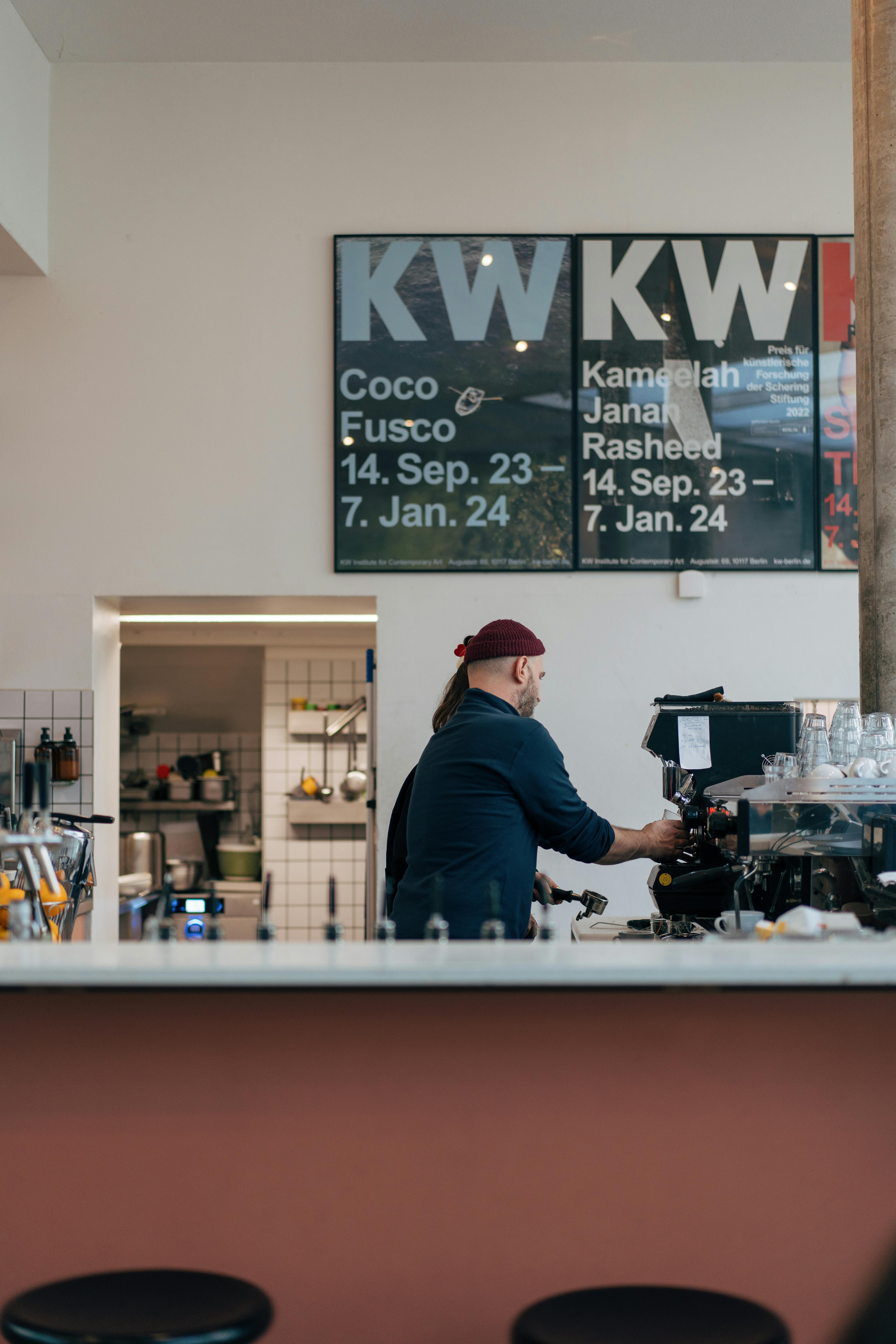Coffee, a beloved beverage enjoyed by millions around the world, has not only become a morning ritual or a means of survival for many, but it has also played a surprising role in shaping political movements. From fueling discussions in coffeehouses that sparked social change to becoming a symbol of resistance and unity, coffee has proven to be more than just a drink. In this article, we will explore the fascinating connection between coffee and its influence on political movements, showcasing how this humble bean has transformed into a powerful force for change. So sit back, grab a cup of your favorite brew, and join us on this journey through the intertwined histories of coffee and politics.

Coffee’s historical connection to politics
Coffee has a long and rich history intertwined with politics. Throughout the centuries, coffeehouses have served as important centers of political discussion and debate, providing a space for individuals to exchange ideas, challenge authority, and shape the course of history.
Coffeehouses as centers of political discussion and debate
Coffeehouses first emerged as vibrant hubs of intellectual and political activity in the Ottoman Empire during the 16th century. Known as “qahveh khaneh,” these establishments allowed people from all walks of life to gather and engage in lively discussions. The egalitarian nature of these spaces fostered an environment where ideas could be freely exchanged, leading to the emergence of intellectual movements and political ideologies.
The spread of coffeehouses across Europe during the 17th and 18th centuries further solidified their role as centers of political discourse. In cities like London, Paris, and Vienna, coffeehouses became popular meeting places for intellectuals, politicians, and activists. Coffeehouses provided an alternative to traditional establishments such as taverns, attracting a more educated clientele and sparking conversations that would shape the political landscape.
The role of coffee in the American Revolution
Coffee played a prominent role in the American Revolution, becoming a symbol of resistance against British rule. As tensions escalated and colonists sought independence, coffeehouses became hotbeds of revolutionary activity. The Green Dragon Tavern in Boston, for example, served as a meeting place for the Sons of Liberty and other revolutionary groups.
In addition to providing a physical space for organizing, coffee became a common drink among the revolutionaries. The Boston Tea Party, a pivotal event in the lead-up to the Revolution, saw colonists protesting British taxes on tea by dumping crates of tea into the Boston Harbor. As a result, colonists turned to coffee as a patriotic alternative, solidifying its association with independence and resistance.
Coffee as a symbol of independence and resistance
Coffee’s symbolic association with independence and resistance extends beyond the American Revolution. Throughout history, coffee has been embraced by political movements as a symbol of freedom and defiance against oppressive regimes.
In the 19th and 20th centuries, coffeehouses became gathering places for revolutionaries and activists in countries such as France, Russia, and Cuba. These venues provided safe spaces for dissidents to discuss political ideas, plan uprisings, and challenge authoritarian rule. Coffee became a unifying symbol, representing shared values and aspirations for a more just and equitable society.
Coffee’s role in modern political movements
Coffee continues to play a significant role in modern political movements, with its ability to foster networking and mobilize activists.
Coffee as a networking tool for activists and organizers
In today’s digitally connected world, coffee has taken on a new role as a networking tool for activists and organizers. Whether meeting at a local coffee shop or sharing a virtual coffee over video calls, the act of sharing a cup of coffee has become a powerful way to build relationships and forge alliances in the pursuit of social and political change.
Coffee breaks during conferences, summits, and protests can serve as informal spaces for activists to connect, exchange ideas, and plan collaborative actions. This informal setting allows for open and honest conversations, fostering trust and solidarity among like-minded individuals.
The use of coffee shops as meeting places for political groups
Coffee shops have increasingly become meeting places for political groups, providing a conducive environment for discussions and strategy sessions. These establishments offer a neutral, accessible, and inclusive space for activists and organizations to convene, strategize, and organize.
From grassroots movements to political campaigns, coffee shops have become vital spaces for building community and mobilizing support. The relaxed atmosphere and familiar surroundings of a local coffee shop can help create a sense of belonging and empowerment among activists.
How coffee is used in fundraising for political campaigns
Coffee has also become a popular tool for political fundraising. Many candidates and political organizations utilize coffee-related events to engage supporters, raise funds, and spread their message. Whether it’s hosting a coffee morning or selling branded coffee products, these initiatives allow supporters to contribute financially while also increasing visibility and generating buzz for the cause.
Coffee fundraisers not only provide financial support but also allow for face-to-face interactions between candidates and their constituents. These interactions help humanize political figures and foster a sense of connection and trust between them and the communities they seek to represent.
Coffee’s symbolism in political movements
Beyond its practical applications, coffee has also taken on symbolic significance within political movements, representing values and ideologies.
The association of coffee with progressive ideologies
Coffee has long been associated with progressive ideologies, reflecting a desire for egalitarianism, social justice, and community building. From the French Revolution’s “Café Politique” to the coffeehouses of the 1960s countercultural movement, coffee has been a symbol of progressive ideals and the pursuit of a more equal and inclusive society.
The egalitarian nature of coffeehouses, where people from all walks of life can gather and engage in discussion without the constraints of social hierarchy, aligns with the principles of equality and inclusivity championed by many progressive movements.
The coffee culture of countercultural movements
Countercultural movements throughout history have embraced coffee as an emblem of their values and aspirations for social change. From beatniks in the 1950s to hippies in the 1960s, coffeehouses became synonymous with counterculture, rebellion, and creative expression.
These movements viewed coffee as more than just a drink; it was a symbol of alternative lifestyles, communal living, and the rejection of mainstream consumerism. Coffeehouses provided a space for individuals to challenge societal norms, explore alternative philosophies, and build communities outside the confines of traditional institutions.
The symbolism of fair trade and ethical coffee in political activism
In recent years, the symbolism of fair trade and ethical coffee has become increasingly intertwined with political activism. Fair trade coffee represents a commitment to social and economic justice, ensuring that coffee farmers receive fair wages and work in safe conditions.
By choosing fair trade and ethically sourced coffee, individuals can make a political statement and support initiatives that prioritize workers’ rights, environmental sustainability, and community development. Ethical coffee has become a tangible way for consumers to align their daily choices with their political values and advocate for a more equitable and sustainable world.
Coffee as a tool for social change
Coffee’s influence extends beyond symbolism and networking; it serves as a powerful tool for driving social change and influencing corporate behavior.
The power of boycotts and coffee in influencing corporate behavior
Boycotts have a long history as a form of political protest, and coffee has often been at the center of these campaigns. Consumers have utilized their purchasing power to demand change from corporations that engage in unethical practices or support oppressive regimes.
By boycotting coffee brands that do not align with their values, individuals and organizations can exert pressure on these companies, compelling them to reassess their policies and practices. The widespread adoption of boycotts has the potential to shape corporate behavior and promote responsible business practices.
The role of coffee brands in supporting political causes
Coffee brands and companies have also recognized their role in driving social change and have increasingly taken positions on political issues. By aligning themselves with causes and contributing financial resources, coffee brands can amplify the impact of social and political movements.
Whether it’s partnering with advocacy organizations, supporting charitable initiatives, or taking a public stance on social justice issues, coffee brands have the opportunity to leverage their influence to effect positive change. Through campaigns and collaborations, these brands can engage their customers and foster a sense of shared purpose and collective action.
The impact of coffee production on environmental and social justice issues
Coffee production itself is deeply intertwined with environmental and social justice issues. The industry faces numerous challenges, including deforestation, water pollution, and exploitative labor practices.
As consumers become more aware of these issues, they can choose to support coffee brands and initiatives that prioritize sustainability, environmental stewardship, and fair trade. By supporting responsible coffee production, individuals can contribute to positive change across the supply chain, from farmers to consumers.

The international dimensions of coffee in politics
Coffee’s political impact extends beyond individual countries, with global dimensions that encompass economic power, trade agreements, and global solidarity.
Coffee as a source of economic and political power for producing countries
Coffee is a major export commodity for several countries, particularly in Central and South America, Africa, and Southeast Asia. The production and trade of coffee can have significant economic and political implications for these countries, shaping their development, stability, and relationship with the global community.
Coffee-producing nations often rely on coffee exports as a vital source of revenue and employment. The success or failure of coffee crops can have a direct impact on these countries’ economies, influencing their political landscapes and social dynamics.
The political impact of coffee trade agreements and regulations
Coffee trade agreements and regulations can shape the dynamics of global politics and influence the economic relationships between producing and consuming countries. These agreements impact market access, tariffs, and regulations, which in turn affect the livelihoods of farmers and the sustainability of the coffee industry.
Coffee’s global trade and the policies that govern it have the potential to perpetuate inequalities or promote fairness and sustainability. The negotiation and implementation of coffee trade agreements become important arenas for political discussion, where the interests of different countries and stakeholders intersect.
The role of coffee in promoting global solidarity and activism
Coffee has the power to foster global solidarity and collective action, transcending geographical boundaries. The fair trade movement, for example, brings together consumers, farmers, and activists from different countries to advocate for more equitable trade practices.
The global coffee industry provides a platform for collaboration and cooperation among international organizations, NGOs, and grassroots movements. From supporting community development projects in coffee-growing regions to establishing platforms for knowledge exchange and capacity building, coffee initiatives have the potential to facilitate global solidarity and activism.
Coffee’s influence on political discourse
Coffee has a unique ability to shape and influence political discourse, offering a catalyst for discussions, debates, and engagement.
The role of coffee in shaping political narratives and ideologies
Coffeehouses have historically been breeding grounds for shaping political narratives and ideologies. By providing a space for the exchange of ideas and stimulating intellectual conversations, coffee plays a role in shaping the beliefs and perspectives of individuals, ultimately influencing the broader political discourse.
The diverse range of individuals and perspectives found in coffeehouses allows for the cross-pollination of ideas and the development of political philosophies. As a result, coffeehouses have been instrumental in building movements, shaping public opinion, and challenging the status quo.
Coffee as a catalyst for political discussions and debates
The act of enjoying a cup of coffee can serve as a catalyst for political discussions and debates, both in formal and informal settings. Coffee breaks during conferences, symposiums, and seminars often provide opportunities for attendees to engage in dialogue, exchange insights, and challenge existing viewpoints.
Coffee’s stimulating properties, combined with its association with intellectual pursuits and social gatherings, can create an environment conducive to critical thinking and the development of informed political opinions. This process of shared dialogue can foster the growth of ideas, nurturing a more robust and inclusive political discourse.
The influence of coffee culture on political engagement
The culture surrounding coffee often shapes the way people engage with politics. Coffee-drinking rituals, such as reading newspapers or discussing current events over a cup of coffee, have long been associated with political engagement and civic participation.
Coffee culture encompasses more than just the beverage; it encompasses a set of social norms, rituals, and practices. These cultural conventions can influence individuals’ level of political awareness, their participation in political activities, and their overall engagement in the democratic process.

The commodification of coffee and its political implications
As coffee has become a highly commodified product, its production, marketing, and consumption bring about political implications that intersect with social and economic issues.
The controversies surrounding fair trade and coffee production
The fair trade movement, while aiming to promote social and economic justice in the coffee industry, has faced its share of controversies and critiques. Critics argue that fair trade certification can be a complex and expensive process for small-scale farmers, limiting their ability to compete in the global market.
The challenges surrounding fair trade certification highlight the inherent complexities of attempting to create a more ethical and balanced coffee supply chain. The continuous conversation and reflection on fair trade practices are essential to ensure the system’s effectiveness and address the concerns raised within the industry.
The social and economic inequality within the coffee industry
Despite the growth of global coffee consumption and the economic value it generates, the benefits of the industry often fail to reach the most vulnerable stakeholders, including farmers and workers. Income inequality, exploitative labor practices, and limited access to resources persist in many coffee-producing regions.
Addressing these inequalities requires collaboration between governments, international organizations, coffee corporations, and NGOs. It necessitates a multifaceted approach that incorporates fair trade practices, responsible sourcing, and sustainable development initiatives.
The impact of globalization on coffee and political movements
Globalization has had a profound impact on the coffee industry, shaping its dynamics and intersecting with political movements. The increasing interconnectedness of markets, the growth of multinational corporations, and the dominance of certain coffee-producing regions have all been influenced by the forces of globalization.
The expansion of international trade and the global demand for coffee have resulted in opportunities as well as challenges for producers and consumers. While globalization has increased access to a variety of coffee products and fostered cultural exchange, it has also raised concerns about market concentration, exploitation, and the erosion of local traditions.
The use of coffee in political marketing and branding
Coffee has become a pervasive element in political marketing and branding strategies, utilized by political figures and organizations to connect with voters and promote their causes.
How political figures and organizations use coffee to appeal to voters
Coffee has become an effective tool for political figures seeking to connect with voters on a personal and relatable level. From enjoying a cup of coffee during campaign stops to hosting coffee-themed events, politicians attempt to create a sense of familiarity and understanding with their constituents.
By incorporating coffee into their campaigning, politicians can tap into the emotional and cultural significance that coffee holds for many individuals. This association can help humanize political figures, making them appear more approachable and relatable to their target audience.
The branding and messaging strategies of political coffee products
Political coffee products, such as branded coffee bags or merchandise with political slogans, have become popular marketing tools. These products allow individuals to showcase their political affiliation or support for a particular cause while also acting as conversation starters or rallying symbols.
The branding and messaging strategies behind political coffee products aim to evoke emotions, ignite political discussions, and mobilize support. Whether it’s through catchy slogans, bold packaging, or the use of specific imagery, these products have the potential to engage individuals in political conversations and build a sense of community around shared ideals.
The impact of coffee-related merchandise on political campaigns
Coffee-related merchandise, such as mugs, t-shirts, and stickers, has become a prominent feature of political campaigns. These items not only generate additional revenue for political organizations but also serve as tangible symbols of support for candidates or causes.
Wearing a political campaign t-shirt or displaying a coffee mug with a candidate’s logo can act as a form of self-expression and political statement. These items become conversation starters, enabling individuals to engage in political discussions and show their support for a particular candidate or cause.
Coffee and activism in the digital age
In the digital age, coffee has found new ways to engage activists and promote political causes through online activism and social media campaigns.
The role of coffee in online activism and social media campaigns
Coffee’s role in online activism and social media campaigns cannot be overstated. Hashtags like #CoffeeActivism and #CoffeeSolidarity allow individuals to rally around a cause, raising awareness, and mobilizing support from across the globe.
Social media platforms provide a virtual space for individuals and organizations to share information, organize campaigns, and inspire action. Coffee, with its universal appeal and cultural significance, becomes a powerful tool for spreading messages, connecting activists, and fostering a sense of solidarity.
The use of coffee hashtags and challenges to promote political causes
Coffee hashtags and challenges have become popular methods for promoting political causes and encouraging civic engagement. Initiatives like the “Coffee Challenge,” where participants donate the cost of a cup of coffee to a political campaign or charity, harness the power of coffee to inspire action and financial support.
By leveraging the hashtag culture prevalent on platforms like Twitter and Instagram, individuals can participate in a broader conversation and amplify their voice. Coffee-related hashtags create a sense of belonging and shared purpose, enabling individuals to see themselves as part of a wider movement for change.
The impact of virtual coffee events on mobilizing support for political movements
Virtual coffee events, such as webinars, live streams, and online forums, have become instrumental in mobilizing support for political movements. These events create spaces for individuals to connect, learn, and strategize together, transcending geographic limitations.
Through virtual coffee events, political organizations can maximize the reach and accessibility of their campaigns, engaging supporters who may not have the resources to attend in-person events. Coffee becomes a shared experience, connecting individuals in a virtual “coffeehouse” where ideas can be exchanged, alliances formed, and actions planned.
The future of coffee’s role in political movements
The role of coffee in political movements is likely to continue evolving, with both challenges and opportunities shaping its impact.
The potential for coffee to continue inspiring political action and change
Coffee’s enduring symbolism, accessibility, and capacity to foster connections position it as a powerful tool for inspiring political action and change. As long as coffeehouses continue to exist as spaces for discussion and collaboration, and as long as individuals continue to engage with the beverage in personal and social contexts, coffee will serve as a catalyst for political movements.
The expanding reach of coffee culture and the rise of conscious consumerism offer opportunities for individuals to channel their political and social values through their coffee choices. By supporting initiatives that prioritize fair trade, sustainability, and ethical practices, individuals can contribute to broader movements aimed at social and political transformation.
The evolving relationship between coffee and political activism
The relationship between coffee and political activism is likely to evolve alongside societal trends and technological advancements. As political discourse continues to shift toward digital spaces, coffee’s role in online activism may further expand, offering new avenues for mobilization, fundraising, and political engagement.
Additionally, emerging issues such as climate change, economic inequality, and social justice are likely to shape the future of coffee’s role in political activism. Coffee may become even more closely intertwined with environmental and social causes as consumers increasingly demand transparency, sustainability, and responsible business practices from coffee brands.
The challenges and opportunities of using coffee as a tool for social and political transformation
Using coffee as a tool for social and political transformation comes with its own set of challenges and opportunities. While coffee can foster connections and mobilize support, it is important to apply a critical lens to its impact and address any potential pitfalls.
Ensuring the effective implementation of fair trade practices, supporting initiatives that promote social and economic justice in the coffee industry, and actively engaging with the complexities of globalization and commodification are essential steps toward making coffee a meaningful tool for social change.
In conclusion, coffee’s historical connection to politics is deeply rooted in its ability to foster discussion, inspire political action, and symbolize independence and resistance. From coffeehouses as centers of political discourse to its role in modern political movements, coffee has played a significant role in shaping political narratives, promoting activism, and driving social change. As we look towards the future, coffee’s potential to inspire political engagement and promote social and political transformation remains strong, presenting both challenges and opportunities for individuals, communities, and nations worldwide. So, let us raise our cup of coffee to the intersection of coffee and politics, a rich and invigorating blend that continues to energize and ignite positive change in our societies.

